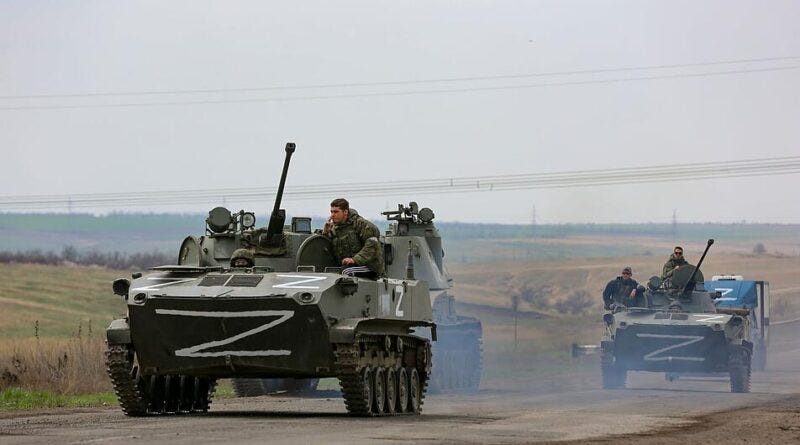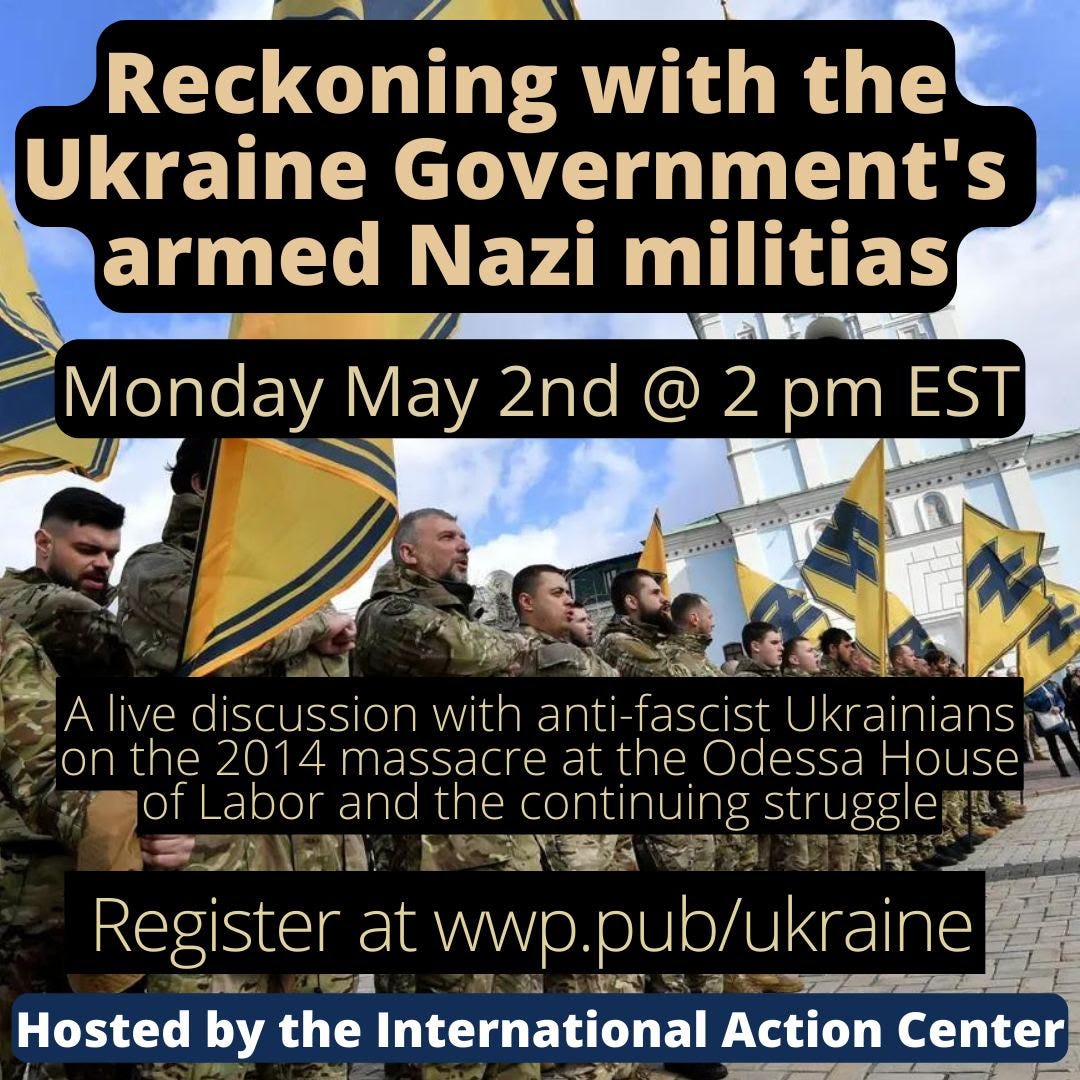Russian military operation in Ukraine is legal
US legal scholar cites precedents in international law
Daniel Kovalik teaches International Human Rights at the University of Pittsburgh School of Law. He is the author of No More War: How the West Violates International Law by Using “Humanitarian” Intervention to Advance Economic and Strategic Interests. His article, “Why Russia’s Intervention in Ukraine is Legal Under International Law,” was published on April 24, 2022 in The Press United, an Online International newspaper based in New Delhi, India; and republished on the Website of Orinoco Tribune, an independent news outlet created in 2018. The Orinoco Tribune is dedicated to providing relevant progressive information about or related to Venezuela for English speakers around the world.

Kobalik begins by rejecting U.S. hypocrisy in criticizing what it calls the “the Russian invasion of Ukraine,” inasmuch as the USA has launched numerous aggressive wars. He cites Jimmy Carter, who allegedly declared recently that the United States is “the most war-like nation in the history of the world,” If Mr. Carter indeed declared such, he surely intended it as hyperbole, taking into account the Spanish and Portuguese conquest of vast regions of the Americas during the sixteenth and seventeenth centuries and the English and French conquest of vast regions of Asia, Africa, and the Middle East from 1750 to 1914, not to mention numerous candidates for the dubious award since the agricultural revolution, which established conquest as the material foundation for human progress.
Nevertheless, the highly regarded former president is on target for the period of human history in which Kobalik has interest, namely, from 1946 to the present. During said period, the USA has been the world champion in wars of aggression, all of them undertaken to attain and solidify U.S. imperialist interest in controlling the natural resources, raw materials, territories, labor, and markets of the world. To aid recall, Kobalik provides a list: Vietnam, Grenada, Panama, the former Yugoslavia, Iraq (twice), Afghanistan, Libya, and Somalia; plus proxy wars in Nicaragua, Syria, and Yemen. (We leave aside for separate analysis U.S. backed coups d’etat during the twentieth century and U.S unconventional wars, consisting of economic sanctions and media manipulation, untaken against various targeted countries since 2014).
The U.S. trail of lies and hypocrisy ought to stimulate skepticism with respect to U.S. claims in the geopolitical arena. However, Kobalik insists, and in this he is entirely correct, that the U.S. legacy does not automatically disprove any current U.S. claims. “We must analyze Russia’s conduct on its own merits.” And this is precisely what Kobalik undertakes in the article.
What are the facts?
Kobalik notes that there already had been a war happening in Ukraine for eight years prior to the Russian military operation of February 2022. He characterizes it as a war by the government of Ukraine and its neo-Nazi battalions against the Russian-speaking peoples of the Donbass, which had claimed the lives of 14,000 people, including many children. Inasmuch as the war was being conducted against a people because of their ethnicity, it can be reasonably described as a genocidal war.
Kobalik observes that these facts were reported by the Western press, until they became inconvenient. He cites a 2018 Reuters article, which describes in detail the integration of thirty-some neo-Nazi battalions into the military and police forces of the Ukrainian government, a fact that gives the Ukrainian government legal responsibility for their conduct. The cited article refers to killing and violence directed against the Russian-speaking population, the Roma peoples and the LGBT community; and to militia attacks against city council meetings, media outlets, and foreign students. Kobalik maintains that Russia has a legal compelling interest, because over 500,000 residents of the Donbass region of Ukraine are also Russian citizens.
Kobalik notes that the pattern of public hate speech combined with large-scale and systemic attacks on the targeted population has been used to convict individuals of genocide. He mentions the example of the genocide case against Jean-Paul Akayesu in Ruanda.
Consistent with the facts reported by Kobalik, the International Action Center commemorated on May 2 the eighth anniversary of the Odessa massacre, in which unarmed trade union people were attacked by armed right-wing militants. A survivor of the massacre reported via video that none of the attackers were punished by the Ukrainian government, and they continued to mock the relatives of victims. He expressed appreciation for the attacks against Nazis militias by the Russian military operation in Donbass.
In the International Action Center Webinar commemorating May 2, 2014, a Ukrainian communist in exile maintained that the Western supported coup d’état of 2013-2014 gave rise to a resurrection of Nazi ideas. He noted that for the past eight years, communists and other progressive forces, including social democrats, have been violently attacked and placed in detention, sometimes not to be heard from again. The repressive right-wing forces use the language of ethnic superiority, an ultra-nationalism that is a new form of Nazism. The exiled communist leader described the Zelensky regime as a repressive dictatorship.
The right of Russia to defend itself
Kobalik points out that NATO invoked the so-called Responsibility to Protect doctrine to justify its “humanitarian interventions” in the former Yugoslavia and Libya. However, none of the states involved in those military interventions could make the claim of self-defense.
In contrast, Russia claims self-defense with respect to Ukraine, pointing to the presence of violent radical groups on its border that had been attacking Russian citizens. These groups, moreover, have been funded and trained by the United States with the intention of destabilizing Russia. Kobalik cites a January 2022 Yahoo News! article that reports on a secret CIA program in the USA, which was initiated in 2015 and which is an insurgency training program directed against Russia.
Kobalik concludes:
In short, there is no doubt that Russia has been threatened, and in a quite profound way, with concrete destabilizing efforts by the US, NATO and their extremist surrogates in Ukraine. Russia has been so threatened for a full eight years. And Russia has witnessed what such destabilizing efforts have meant for other countries, from Iraq to Afghanistan to Syria to Libya – that is, nearly a total annihilation of the country as a functioning nation-state.
It is hard to conceive of a more pressing case for the need to act in defense of the nation. While the UN Charter prohibits unilateral acts of war, it also provides, in Article 51, that “[n]othing in the present Charter shall impair the inherent right of individual or collective self-defense… ” And this right of self-defense has been interpreted to permit countries to respond, not only to actual armed attacks, but also to the threat of imminent attack.
In light of the above, it is my assessment that this right has been triggered in the instant case, and that Russia had a right to act in its own self-defense by intervening in Ukraine, which had become a proxy of the US and NATO for an assault – not only on Russian ethnics within Ukraine – but also upon Russia itself. A contrary conclusion would simply ignore the dire realities facing Russia.
Although Kobalik focuses on the issue of the right of Russia to defend itself and Russian citizens against violent neo-Nazi militias, there is also the issue of Russia having been placed under threat by constant NATO expansion. The issue of NATO expansionism was central to Russian President Vladimir Putin’s February 21 speech, in which he announced Russian recognition of the independence and sovereignty of the Donetsk People’s Republic and the Lugansk People’s Republic (see “Russia, Ukraine, and the media: Invasion or defensive military action? February 25, 2022); and to the support of the Cuban government and media for the right of Russia to defend itself (see “Cuba backs Russia on Ukraine,” March 1, 2022).
War and Propaganda
In the International Action Center Webinar of May 2, U.S. anti-war activist Sara Founders pointed out that every U.S. war is accompanied by propaganda against the enemy. Well-paid journalists generate stories, a loose construction of the real stories of the local population. Later, it is seen that the prevailing narrative was an essentially false construction, designed to justify the U.S. military operation. The journalists have moved on to another terrain, or to another stage in their careers, while their collaborators have been left behind.
A free subscription option is available, with capacity to read, send, and share all posts. A paid subscription ($5 per month or $40 per year) enables you to make comments and to support the costs of the column; full subscribers ($40 per year) also receive a free PDF copy of my book on Cuba and the world-system.
Follow me on Twitter: Charles McKelvey@CharlesMcKelv14




So Charles, how do you explain this? Is he just a stooge full of Western propaganda? Doesn't seem likely. https://www.axios.com/2022/05/23/russian-diplomat-united-nations-resigns-ukraine
I don't know, Charles, Kovalik justifying the Russian invasion into Ukrainian territory because Russian-speaking Ukrainian citizens of Donbass are being threatened, or that the Russian border is threatened by Ukrainians on their border, or because Ukraine is "threatening" to reclaim the Ukrainian territory of Crimea which was forcefully taken over by Russia, sounds like the same justification the US made for their many repeated, illegal invasions of Latin American countries such as Nicaragua, Cuba, Grenada, that their (US) business interests or US citizens were in danger and needed to be rescued.